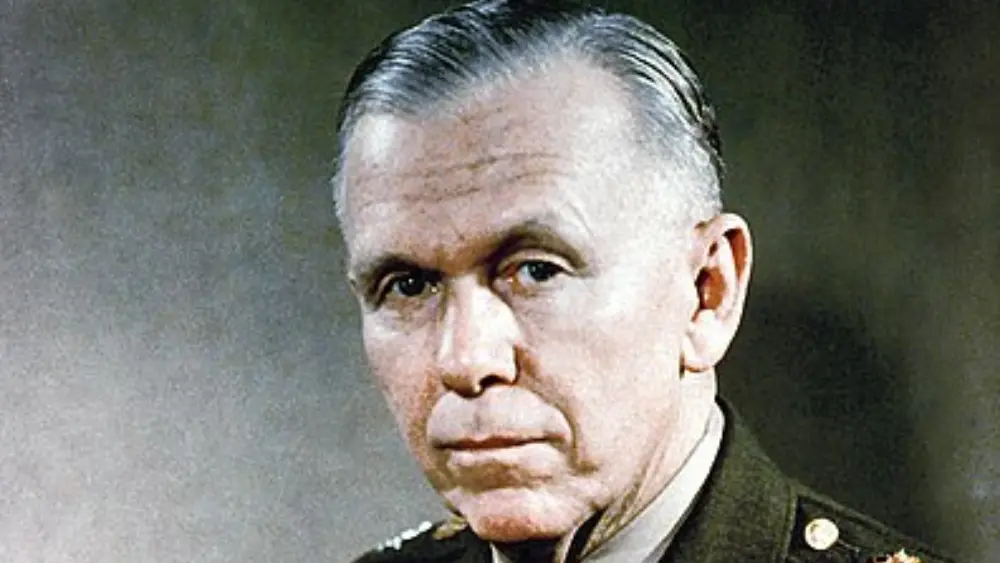General George C. Marshall, born on December 31, 1880, in Uniontown, Pennsylvania, emerged as a towering figure in American military and diplomatic history. His unparalleled leadership during World War II and subsequent role as the architect of the Marshall Plan secured his legacy as a key figure in the reconstruction of post-World War II Europe.
Early Life and Military Career
George Marshall’s early life laid the foundation for a distinguished military career characterized by a profound commitment to excellence and a sense of duty. Born in Uniontown, Pennsylvania, in 1880, Marshall’s formative years were shaped by the disciplined environment of military institutions. His dedication to academic and personal excellence became evident when he graduated from the Virginia Military Institute in 1901. This early experience instilled in him a strong work ethic and a deep sense of responsibility that would define his future endeavors.
Embarking on a military career that would span several decades, Marshall quickly distinguished himself through his leadership qualities. His strategic acumen and ability to navigate complex military landscapes propelled him through the ranks, marking him as a rising star within the U.S. Army. Marshall’s early experiences in the military not only showcased his commitment to service but also set the stage for the remarkable leadership roles he would assume later in his career.
George Marshall: World War II Leadership
George Marshall’s leadership during World War II played a pivotal role in the Allied victory. Serving as the Chief of Staff of the United States Army, Marshall assumed a central and indispensable role in planning and coordinating military operations on a global scale. His strategic vision, coupled with exceptional organizational skills, set the foundation for the effective mobilization and deployment of Allied forces. Marshall’s ability to navigate the complexities of wartime decision-making earned him the respect of military leaders and policymakers alike, establishing him as a key architect of the Allies’ success.
As Chief of Staff, Marshall faced the formidable task of managing the vast and diverse elements of the U.S. military during a time of unprecedented global conflict. His emphasis on strategic planning, logistical efficiency, and the integration of military forces across theaters of operation contributed significantly to the overall success of Allied campaigns. Marshall’s leadership style, characterized by a calm and focused demeanor, was particularly valuable in times of crisis. His unwavering commitment to the Allied cause and his adept management of military resources solidified his reputation as one of the preeminent military leaders of World War II.
Marshall Plan: A Vision for Europe’s Recovery
After the devastation of World War II, the task of reconstructing war-torn Europe loomed large. In 1947, George Marshall, then serving as the United States Secretary of State, unveiled a groundbreaking initiative known as the Marshall Plan. This visionary program sought to address the profound economic and social challenges faced by European nations in the aftermath of the war. The Marshall Plan was not merely an economic aid package; it was a strategic effort to rebuild shattered economies, stabilize nations, and prevent the spread of communism. The plan outlined a comprehensive approach to recovery, emphasizing the interdependence of economic prosperity, political stability, and the prevention of ideological influences detrimental to democratic values.
The Marshall Plan, officially titled the European Recovery Program, was a testament to Marshall’s strategic thinking and his commitment to fostering international stability. By providing substantial financial assistance to European countries, the plan aimed to jumpstart economic recovery, enabling these nations to rebuild infrastructure, stimulate trade, and improve living conditions. Beyond the economic aspects, the Marshall Plan had profound political implications, reinforcing the idea that economic assistance and collaboration were crucial tools in the broader fight against the ideological and political challenges posed by the Cold War. Through the Marshall Plan, George Marshall left an enduring legacy, contributing not only to the economic revival of post-war Europe but also to the strategic containment of communism in the region.
George Marshall: Diplomacy and Statesmanship
George Marshall’s effectiveness as a diplomat and statesman came to the forefront during the implementation of the Marshall Plan. Recognizing the importance of garnering international support for the ambitious recovery program, Marshall embarked on a tireless campaign of shuttle diplomacy. He engaged in extensive travels, meeting with European leaders to build consensus and rally support for the plan. Marshall’s diplomatic skills were instrumental in navigating the delicate diplomatic landscape of post-war Europe as he worked to bridge differences and foster a spirit of collaboration among nations still recovering from the ravages of war.
Marshall’s commitment to multilateralism was a cornerstone of his diplomatic approach. Understanding that the challenges facing Europe required a collective and coordinated effort, he sought to foster an environment of international cooperation. His statesmanship and ability to navigate complex political dynamics contributed significantly to the success of the Marshall Plan. By promoting collaboration and emphasizing shared goals, Marshall not only facilitated the economic recovery of Europe but also strengthened the ties between the United States and its European allies. His diplomatic efforts underscored the importance of visionary leadership in shaping global initiatives and building a foundation for lasting international partnerships.
Recognition with the Nobel Peace Prize
In 1953, George Marshall received the prestigious Nobel Peace Prize in recognition of his extraordinary contributions to international diplomacy and peacemaking through the implementation of the Marshall Plan. The award underscored the profound impact of Marshall’s vision in rebuilding post-war Europe and fostering a climate of stability and cooperation. The Nobel Peace Prize committee acknowledged that Marshall’s efforts went beyond the immediate economic reconstruction of war-torn nations; they also recognized the broader significance of his work in promoting lasting peace through collaborative, diplomatic initiatives.
Marshall’s receipt of the Nobel Peace Prize marked a poignant acknowledgment of his commitment to international cooperation and the belief that economic stability was integral to preventing the recurrence of global conflict. The honor celebrated not only the success of the Marshall Plan in revitalizing European economies but also the enduring legacy of a statesman whose strategic vision contributed significantly to the establishment of a more peaceful and interconnected world in the aftermath of one of the most devastating conflicts in history.
George Marshall: Secretary of Defense and the Marshall Legacy
After his role as Secretary of State, George Marshall assumed the position of Secretary of Defense, further solidifying his impact on U.S. military policy during a pivotal period of the Cold War. In this crucial role, Marshall continued to emphasize the importance of military readiness and strategic planning. Aware of the complex geopolitical landscape and the escalating tensions of the Cold War, Marshall played a key role in shaping the defense policies that would guide the United States through this challenging era.
The legacy of George Marshall as Secretary of Defense extends beyond his immediate term in office. His strategic vision and commitment to a strong and prepared military laid the groundwork for the United States’ posture during the Cold War. Marshall’s emphasis on readiness and forward-thinking defense strategies contributed significantly to the nation’s ability to navigate the uncertainties of the Cold War period. The Marshall legacy endures as a testament to his enduring impact on U.S. military policy and his role in shaping the nation’s approach to global security during a critical juncture in history.

Legacy and Impact on Global Affairs
George Marshall’s legacy transcends his various roles in government, with perhaps the most profound impact stemming from the success of the Marshall Plan. By spearheading a comprehensive initiative that focused on economic recovery, stability, and the prevention of the spread of communism, Marshall left an indelible mark on global affairs. The success of the Marshall Plan not only revitalized war-torn European economies but also set a precedent for the efficacy of diplomatic and economic measures in preventing conflict and fostering international cooperation. Marshall’s legacy endures as a testament to the transformative power of strategic thinking and collaborative efforts in shaping positive outcomes on the world stage.
Marshall’s impact on global affairs is also reflected in his leadership during World War II and the Cold War. As Chief of Staff of the United States Army and later as Secretary of State and Secretary of Defense, he played pivotal roles in shaping U.S. military strategy and international diplomacy. His emphasis on military readiness, strategic planning, and international collaboration contributed significantly to the United States’ ability to navigate the challenges of these critical periods in history. George Marshall’s legacy is not only one of effective statesmanship but also of a visionary leader whose influence continues to resonate in the realms of diplomacy, security, and global cooperation.




